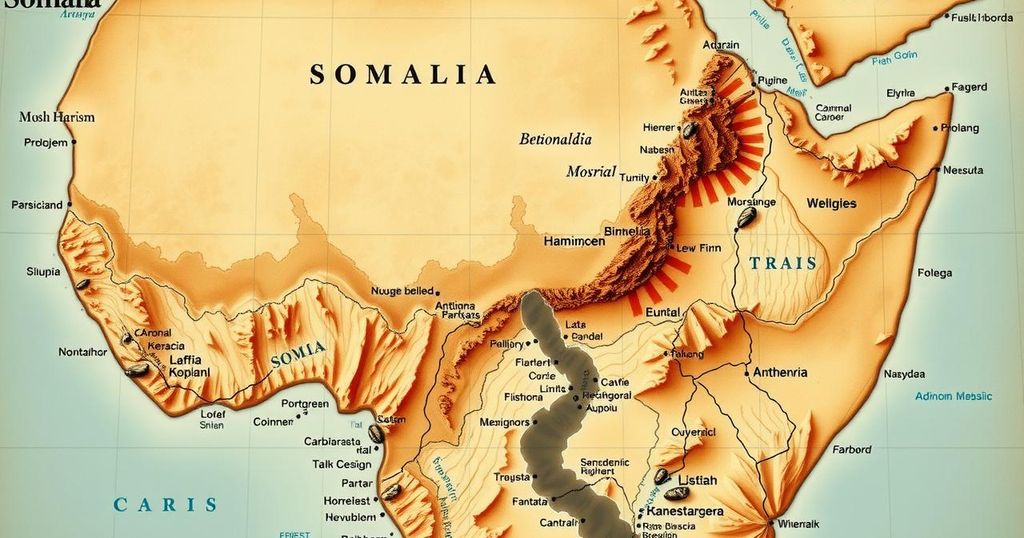Online rumors have alleged that Ilhan Omar’s father, Nur Omar Mohamed, committed war crimes while serving in Somalia. Despite being a colonel in the Somali National Army and involved in conflict during the 1977-78 Somali-Ethiopian War, no credible evidence links him to war crimes. His military history is complex, with a significant lack of evidence regarding specific actions during critical periods of Somalia’s civil unrest.
In recent years, rumors have circulated online alleging that U.S. Representative Ilhan Omar’s father, Nur Omar Mohamed, committed war crimes while serving as a military officer in Somalia. However, comprehensive details about Nur’s life remain scant, and he passed away from COVID-19 in 2020. Though Omar described him as an “educator” in her memoir, his obituary indicated that he held the rank of colonel in the Somali National Army and led a regiment during the Somali-Ethiopian War (1977-78).
Under the regime of President Mohamed Siad Barre, the Somali National Army engaged in war crimes against the Issaq clan in the 1980s. Despite ongoing rumors, there is currently no evidence to confirm that Nur participated in such activities. Snopes previously reported on these allegations in 2019, noting that Nur entered the U.S. legally, securing asylum status without credible accusations of wrongdoing in Somalia.
Some sources have attempted to assert that Omar’s father was known as Nur Said Mohamed Elmi, but for consistency, he is referred to as Nur Omar Mohamed in this report. Following his death, the Sahan Journal published an obituary describing him as an esteemed officer who helped command forces during the Ogaden War and concluded his military service in 1991 after the ousting of Siad Barre.
The Somali-Ethiopian War, often referred to as the Ogaden War, was ignited by territorial disputes over Somali-populated regions in Ethiopia. The conflict saw significant military engagement, leading to tumultuous socio-political dynamics whereby allegations of human rights violations emerged against the Barre regime. However, the war ended without territorial changes, leading to increased dissent in Somalia and several coup attempts against Barre.
Heritage plays a vital role in Somali society, deeply influenced by the prevalent clan system. Omar notes in her memoir that her father was part of a northern-based clan, the Majerteen, which initially allied with Barre. However, tensions escalated within this clan post-war, culminating in a perceived shift whereby Barre targeted clan members following failed coups.
The specifics of Nur’s actions post-war remain unclear, as Ilhan Omar’s family lived in southern Somalia, where the military committed atrocities against civilians during clampdowns on dissenting clans. After the conflict, the regime actively disenfranchised the Issaq clan, leading to rampant human rights abuses and forced migrations.
In response to these abuses, members of the Issaq formed the Somali National Movement (SNM), intensifying the regime’s crackdown on perceived threats, including systemic killings and destruction of Issaq properties. Historical records illustrate the extreme violence against these communities, significantly altering the socio-political landscape in Somalia and contributing to Omar’s family’s eventual flight to Kenya.
Overall, the period between the end of the Somali-Ethiopian War and the collapse of Barre’s regime is crucial for understanding the complex dynamics of war crimes in Somalia. However, no definitive evidence ties Nur Omar Mohamed directly to any war crimes or genocidal acts during this turbulent period. In his later years, he was reportedly involved in rebuilding efforts for Puntland’s security forces, underscoring a transition informed by his background and regional affiliations.
In summary, allegations regarding Nur Omar Mohamed’s involvement in war crimes remain unsubstantiated, with no definitive evidence supporting such claims. His military history is framed within a broader narrative of violence and conflict in Somalia, particularly during the Siad Barre regime. Given the lack of conclusive information about his actions during critical years, any speculation remains inconclusive, underscoring the complexities of familial and national history in Somalia.
Original Source: www.snopes.com






